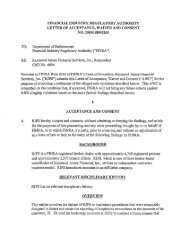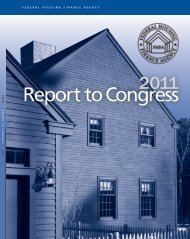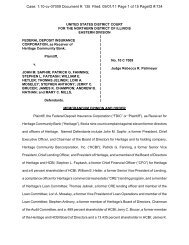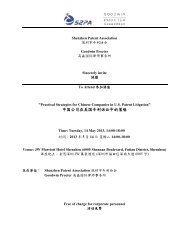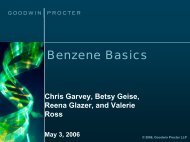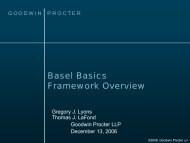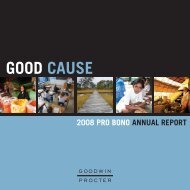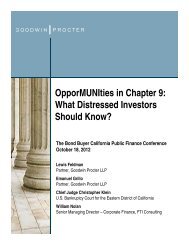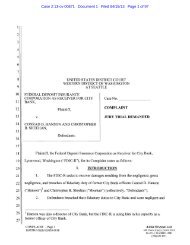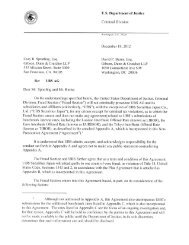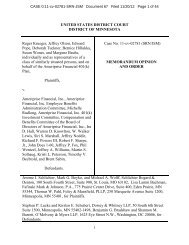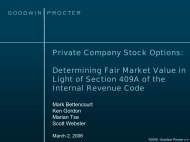SPhinX Chapter 15 Opinion Misses the Mark - Goodwin Procter LLP
SPhinX Chapter 15 Opinion Misses the Mark - Goodwin Procter LLP
SPhinX Chapter 15 Opinion Misses the Mark - Goodwin Procter LLP
You also want an ePaper? Increase the reach of your titles
YUMPU automatically turns print PDFs into web optimized ePapers that Google loves.
2. After notice and hearing, §<strong>15</strong>17<br />
dictates that <strong>the</strong> court must enter an<br />
order recognizing <strong>the</strong> foreign<br />
proceeding if <strong>the</strong> proceeding is a<br />
foreign main proceeding or a foreign<br />
non-main proceeding within <strong>the</strong><br />
meaning of §<strong>15</strong>02 and <strong>the</strong> petition<br />
meets <strong>the</strong> §<strong>15</strong><strong>15</strong> requirements;<br />
3. Both §§<strong>15</strong>02 and <strong>15</strong>17(b) state that<br />
a foreign main proceeding is one<br />
pending in <strong>the</strong> country where <strong>the</strong><br />
debtor has <strong>the</strong> center of its main<br />
interests (COMI), while a foreign<br />
non-main proceeding is one pending<br />
in a foreign country where <strong>the</strong> debtor<br />
has an establishment; 7<br />
4. <strong>Chapter</strong> <strong>15</strong> contains no definition<br />
of center of main interests, but<br />
contains a presumption that, in <strong>the</strong><br />
absence of evidence to <strong>the</strong> contrary,<br />
<strong>the</strong> debtor’s registered office is its<br />
COMI; 8 case law in Europe, to which<br />
regard must be had under §<strong>15</strong>08,<br />
establishes that <strong>the</strong> presumption can<br />
be rebutted by showing that <strong>the</strong> “head<br />
office” functions were carried out in<br />
a jurisdiction o<strong>the</strong>r than where <strong>the</strong><br />
registered office was located. 9<br />
5. Section <strong>15</strong>02 defines “establishment”<br />
as “any place of operations<br />
where <strong>the</strong> debtor carries out a<br />
nontransitory economic activity.”<br />
This definition (which is a little more<br />
widely expressed than that in <strong>the</strong> EC<br />
Regulation) arose from <strong>the</strong> rejection,<br />
in relation to <strong>the</strong> EC Regulation, of<br />
<strong>the</strong> presence of assets as a sufficient<br />
basis for taking local jurisdiction. 10<br />
Put concisely, <strong>the</strong>re must be a place<br />
of business for <strong>the</strong>re to be an<br />
6 §<strong>15</strong><strong>15</strong>(b) (b) A petition for recognition shall be accompanied by—<br />
(1) a certified copy of <strong>the</strong> decision commencing such foreign<br />
proceeding and appointing <strong>the</strong> foreign representative;<br />
(2) a certificate from <strong>the</strong> foreign court affirming <strong>the</strong> existence<br />
of such foreign proceeding and of <strong>the</strong> appointment of <strong>the</strong><br />
foreign representative; or<br />
(3) in <strong>the</strong> absence of evidence referred to in paragraphs (1)<br />
and (2), any o<strong>the</strong>r evidence acceptable to <strong>the</strong> court of <strong>the</strong><br />
existence of such foreign proceeding and of <strong>the</strong> appointment<br />
of <strong>the</strong> foreign representative.<br />
7 §<strong>15</strong>02. Definitions—<br />
(4) ‘foreign main proceeding’ means a foreign proceeding<br />
pending in <strong>the</strong> country where <strong>the</strong> debtor has <strong>the</strong> center of its<br />
main interests;<br />
(5) ‘foreign nonmain proceeding’ means a foreign<br />
proceeding, o<strong>the</strong>r than a foreign main proceeding, pending in<br />
a country where <strong>the</strong> debtor has an establishment;<br />
The basic definition of “foreign proceeding” is in §101(23), <strong>the</strong> general<br />
definition section of <strong>the</strong> Bankruptcy Code: “‘foreign proceeding’ means<br />
a collective judicial or administrative proceeding in a foreign country,<br />
including an interim proceeding, under a law relating to insolvency or<br />
adjustment of debt in which proceeding <strong>the</strong> assets and affairs of <strong>the</strong><br />
debtor are subject to control or supervision by a foreign court, for <strong>the</strong><br />
purpose of reorganization or liquidation.”<br />
8 §<strong>15</strong>16(c).<br />
9 Daisytek [2003] BCC 562; Ci4Net [2005] BCC 277; Collins & Aikman<br />
(Lawrence Collins J. <strong>15</strong> July 2005); Hettlage ZIP 20/2004 p.962;<br />
Mliekotej sro (“Parmalat Slovakia”), (Unrep, 14 June 2004, Municipal<br />
Court of Fejer/Szekesfehervar); MPOTEC GmbH [2006] BCC 681;<br />
Eurotunnel Finance Ltd. (Paris Commercial Court, 2 August 2006);<br />
<strong>Opinion</strong> of Advocate-General Jacob in Eurofood [2005] BCC 1,0201,<br />
paragraphs 111, 112.<br />
10 See Moss and Smith, “Moss, Fletcher and Isaacs: The EC Regulation on<br />
Insolvency Proceedings” at para. 8.26.<br />
“establishment.”<br />
<strong>Chapter</strong> <strong>15</strong> substituted a simple,<br />
objective standard for recognition in place<br />
of <strong>the</strong> subjective requirements of former<br />
§304, which was repealed. Section 304<br />
did not have a recognition requirement as<br />
a first step, but ra<strong>the</strong>r focused on whe<strong>the</strong>r<br />
relief should be granted to a foreign<br />
representative in light of issues such as<br />
just treatment of claim holders in <strong>the</strong><br />
foreign proceeding, fairness and<br />
convenience to U.S. creditors and <strong>the</strong><br />
order in which proceeds of <strong>the</strong> foreign<br />
estate would be distributed. In contrast,<br />
under chapter <strong>15</strong>, <strong>the</strong> court must initially<br />
determine whe<strong>the</strong>r <strong>the</strong> petition and <strong>the</strong><br />
accompanying documents meet <strong>the</strong><br />
requirements of §<strong>15</strong><strong>15</strong> and whe<strong>the</strong>r <strong>the</strong><br />
foreign proceeding meets <strong>the</strong> definitional<br />
requirements of §§<strong>15</strong>02 and <strong>15</strong>17. 11<br />
The legislative history of §<strong>15</strong>17<br />
emphasizes <strong>the</strong> streamlined approach:<br />
The decision to grant recognition<br />
is not dependent upon any<br />
findings about <strong>the</strong> nature of <strong>the</strong><br />
foreign proceedings of <strong>the</strong> sort<br />
previously mandated by §304(c)<br />
of <strong>the</strong> Bankruptcy Code. The<br />
requirements of this section,<br />
which incorporates <strong>the</strong> definitions<br />
in §<strong>15</strong>02 and §§101(23) and (24),<br />
are all that must be fulfilled to<br />
attain recognition. 12<br />
In addition, since foreign proceedings are<br />
eligible for recognition only if <strong>the</strong>y meet<br />
<strong>the</strong> definitional requirements of ei<strong>the</strong>r a<br />
foreign main proceeding or a foreign nonmain<br />
proceeding, <strong>the</strong>re can be no<br />
recognition without <strong>the</strong> concomitant<br />
determination of qualification as a main<br />
proceeding or a non-main proceeding: If<br />
<strong>the</strong> foreign proceeding is not pending in<br />
a country where <strong>the</strong> debtor has its COMI<br />
or where it has an establishment, <strong>the</strong>n <strong>the</strong><br />
foreign proceeding is simply not eligible<br />
for recognition under chapter <strong>15</strong>. As<br />
emphasized in <strong>the</strong> legislative history,<br />
recognition is a one step process that<br />
includes <strong>the</strong> designation of <strong>the</strong> foreign<br />
proceeding as main or nonmain:<br />
The drafters of <strong>the</strong> Model Law<br />
understood that only a main<br />
proceeding or a non-main<br />
proceeding meeting <strong>the</strong> standards<br />
of §<strong>15</strong>02 (that is, one brought<br />
where <strong>the</strong> debtor has an<br />
establishment) were entitled to<br />
recognition under this section.<br />
The Model Law has been slightly<br />
modified to make this point clear<br />
by referring to <strong>the</strong> §<strong>15</strong>02 definition<br />
of main and non-main<br />
proceedings, as well as to <strong>the</strong><br />
general definition of a foreign<br />
proceeding in §101(23). A<br />
petition under §<strong>15</strong><strong>15</strong> must show<br />
that proceeding is a main or a<br />
qualifying non-main proceeding<br />
in order to obtain recognition<br />
under this section. 13<br />
The <strong>SPhinX</strong> opinion tortures this<br />
simple concept under <strong>the</strong> guise of chapter<br />
<strong>15</strong>’s supposed “flexibility”:<br />
This flexibility is evident not only<br />
in <strong>the</strong> policy statement in<br />
§<strong>15</strong>01(a) but also in Bankruptcy<br />
Code §<strong>15</strong>22, which provides that<br />
<strong>the</strong> court may grant or modify<br />
interim relief under §<strong>15</strong>19 or<br />
additional relief under §<strong>15</strong>21<br />
“only if <strong>the</strong> interests of creditors<br />
and o<strong>the</strong>r interested entities,<br />
including <strong>the</strong> debtor, are sufficiently<br />
protected.” 11 U.S.C.<br />
§<strong>15</strong>22(a). 14<br />
Flexibility also is inherent in <strong>the</strong><br />
various forms of relief that <strong>the</strong><br />
court may grant, upon a proper<br />
showing, to a foreign representative.<br />
<strong>15</strong><br />
<strong>Chapter</strong> <strong>15</strong> also provides flexibility<br />
by acknowledging <strong>the</strong><br />
possibility of a concurrent plenary<br />
case under o<strong>the</strong>r chapters of <strong>the</strong><br />
Bankruptcy Code while a foreign<br />
proceeding is pending, permitting<br />
a foreign representative in a<br />
recognized foreign proceeding to<br />
commence (11 U.S.C. §<strong>15</strong>11) or<br />
participate in (11 U.S.C. §§<strong>15</strong>12,<br />
<strong>15</strong>23) such a case, and providing<br />
for cooperation and direct<br />
communication between <strong>the</strong><br />
bankruptcy court and foreign<br />
courts or foreign representatives<br />
and bankruptcy trustees and<br />
foreign courts or foreign representatives.<br />
16<br />
Finally, chapter <strong>15</strong> demonstrates<br />
its flexibility in provisions that<br />
permit <strong>the</strong> court to condition relief<br />
(11 U.S.C. §<strong>15</strong>22(b)) or modify<br />
previously granted relief in light<br />
of changed circumstances. 17<br />
13 H. Rep. 109-31, p. 114. §<strong>15</strong>01 states that chapter <strong>15</strong> is <strong>the</strong> United<br />
11 The foreign representative must also be a person or body that meets States adaptation of <strong>the</strong> UNCITRAL Model Law on Cross-Border<br />
<strong>the</strong> definitional requirements of §101(24): “a person or body, including Insolvency.<br />
a person or body appointed on an interim basis, authorized in a foreign 14 <strong>SPhinX</strong>, supra at p. 13.<br />
proceeding to administer <strong>the</strong> reorganization or <strong>the</strong> liquidation of <strong>the</strong><br />
<strong>15</strong><br />
debtor’s assets or affairs or to act as a representative of such foreign Id. at p. 14<br />
proceeding.”<br />
16 Id. at p. 14<br />
12 H. Rep. 109-31, p.114. 17 Id. at p. <strong>15</strong>.<br />
44 Canal Center Plaza, Suite 404 • Alexandria, VA 22314 • (703) 739-0800 • Fax (703) 739-1060 • www.abiworld.org



